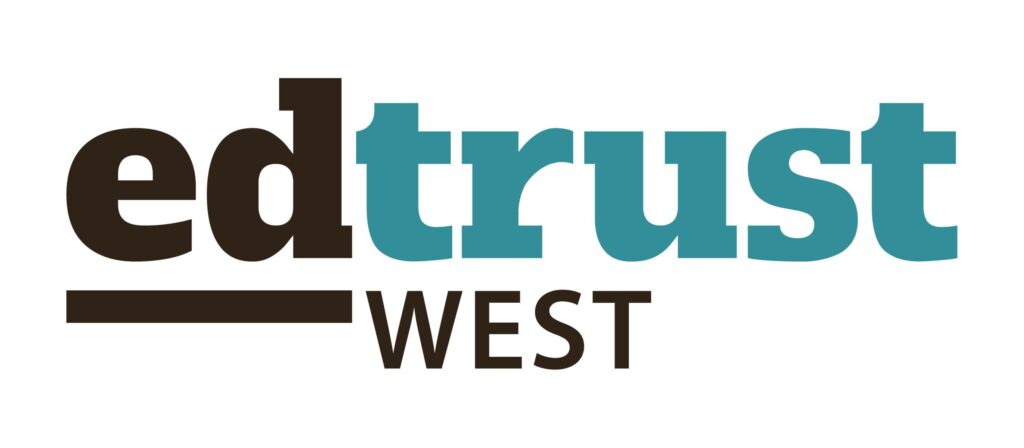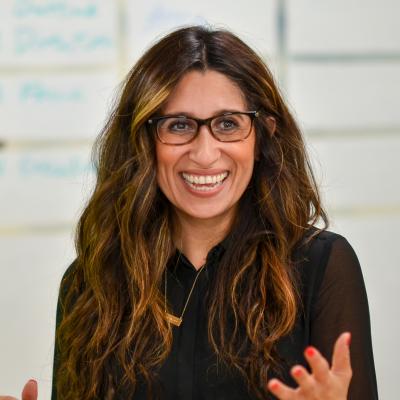I became familiar with EdTrust—West earlier in my career, and I remember coming across reports from the organization that were notably more accessible and action-oriented than many of the other policy reports I’d read. Much of my graduate training and experience was in qualitative research, and while EdTrust—West’s work pulled in qualitative work as well, the value for me was that it helped make quantitative data and research accessible and actionable. I’ve always found it important to make sure this work doesn’t just sit on a shelf – that it can be picked up and used right away to help make students’ experiences better. So I also appreciated how EdTrust—West focused on engaging in systems change work directly with practitioners across the state. In my previous role, I got to expand that practitioner-focused work, starting the organization’s first formal advisory board of educators – the Educator Advisory Council.
I’ve also found that even in the education equity sector, conversations and policy work can still lack an explicit focus on racial equity. The way EdTrust—West recognizes and reaffirms the need for race-specific equity work is a big part of what I find most fulfilling personally and professionally here.
Question: How did your own experience in school and college in Southern California shape your understanding of our education systems and the equity issues in them?
I always loved school, I lived in Baldwin Hills – at the bottom of the hill – and went to my neighborhood school up to 2nd grade and I remember thriving. Around that time I learned the power of social capital, even if I didn’t have the terminology for the concept yet. A neighbor in our apartment building told my mom about a neighboring – and so-called “better” – school district, Culver City, where she should enroll us. Going to this new school I felt different for the first time. I quickly learned that there were socioeconomic differences between what my school mates had access to and what I had access to. This new school had a language immersion program where multilingualism was embraced and celebrated. We were pushed, sometimes it felt excessively, to achieve academically. Somehow this new school was “better” even if it didn’t always feel that way as a student. In fifth grade my family moved to Southeast LA and I was enrolled in the nearby neighborhood elementary school. I remember somehow knowing I was ahead of my peers, mostly in English Language Arts as some of the books that were assigned I had already read in my other school the previous year. My parents decided to send my sisters and me back to Culver City schools once we entered middle school and through high school. There we had access to many electives, extracurriculars, AP courses, sports, and technology opportunities, along with teachers and counselors who supported my academic success. At this school going to college was expected, college visits were organized, and we had access to college counselors and admissions officers.
After high school, I attended Long Beach State, which helped shape my identity as an educator and vision for educational justice. Long Beach State is where I acquired the language to be able to articulate the inequities I would witness as a high school English teacher in one of the largest school districts in the nation. And it’s where I learned to advocate in community with my students and fight alongside them for a more humanizing educational experience. When I became a teacher in LAUSD, it became blatantly clear that I had a very different K-12 experience than my students in Southeast LA. AP classes were sparse, teachers didn’t really talk with students about going to college. The infrastructure to support students’ academic success was lacking. There were teachers who were supportive, but most spoke about students in deficit ways. The combination of my own school and college experiences – some incredibly beneficial and supportive, others alienating and disheartening – plus being a teacher myself, allowed me to see beyond the surface of things, and to understand educational equity issues and disparities in a very tangible, and often infuriating way. And I’ve also been able to see how much we can achieve and how much we can improve the experiences – not just of students in K-12 schools, but also for college students and particularly for students in educator preparation programs.
Question: The disparities we see in educational outcomes are so tied to deeply rooted, longstanding patterns of inequality, racism, and classism. Unwinding those roots and reversing those patterns will take time – but shouldn’t take forever. What do you see as some of the most promising opportunities to positively impact students at early learning centers, in schools, and on college campuses in Southern California today/right away?
I think even within the immediate opportunities we have, we can’t lose sight of the need to unwind the ways long-rooted inequities exist in our policies and practices. Investments in California State Preschool Program and Transition Kindergarten, for example, are promising efforts and show that the state is prioritizing providing families the early learning and care services they need. But even as we applaud and implement these investments, we can’t lose sight of the need to address inequities in the early learning and care workforce so that the predominantly women of color workforce is supported and paid what they deserve.

There are also other recent policy changes and programs that can be leveraged quickly to make a difference for students now. For instance, investments in dual enrollment, a diverse educator workforce, and the implementation of the English learner roadmap are particularly important for the academic, social, and emotional success of all students, particularly students of color and low-income students in Southern California.
In higher education, the field can no longer sidestep the urgency of supporting students’ basic needs. Things like housing, food insecurity, childcare for parenting students – these can be the difference between whether or not a student can attend a class or enroll at all in any college courses. The cost of college tuition alone is still a huge barrier for so many students, which should be evident by the way student loan relief dominates the news. So we need to focus our energy on ensuring financial aid keeps pace with the increasing costs of tuition – especially in the fourth largest economy in the world, especially in a state where the University of California used to be free to attend.
Question: EdTrust—West has been doing work in Southern California and working closely with partners in the region for years, what’s different about this new role and how will the organization’s work in the area change?
We’ll definitely continue to partner with folks in the region to advocate for an equitable and humanizing educational experience that honors the needs and wants of Southern California’s students, families, and communities. One of the reasons I was so excited about this new role is we aren’t flying in from elsewhere, EdTrust—West has been closely connected to and working with partners in and around the greater Los Angeles region for many years. We partner closely with Alliance for A Better Community, Early Edge California, Advancing Justice-LA, Catalyst California (formerly Advancement Project California), Californians Together, Center for Equity for English Learners, UnidosUS, the Greater LA Education Foundation to support the success of the state’s emerging bilingual kids – English Learner and Dual Language Learner students. Our collaborative efforts with practitioners in the LA County Office of Education and in K-12 school districts around LA County mean we’ve been able to work together to identify and eliminate barriers to student success and engagement in real, concrete ways.
The work we’ve been doing in Southern California for years is a big part of what led us to realize the need to deepen our local work and have a more formalized presence in the region. EdTrust—West engages in statewide advocacy, but has always prioritized uplifting the experiences of students, educators, and families in communities to ensure state policy work is targeted and equitable. So we will continue to partner with folks in the region to do just that – to advocate for an equitable and humanizing educational experience that honors the needs and wants of SoCal’s students, families, and communities. What will change is our ability to be much more engaged in local advocacy and lend our research skills to publish more reports, policy briefs, implementation guidance and materials that explicitly focus on the Greater Los Angeles region. You’ll see us at more events, hosting more opportunities for advocates and educators to engage with actionable data, and participating in more direct work to positively impact students in the classrooms and on the campuses that call Southern California home.


